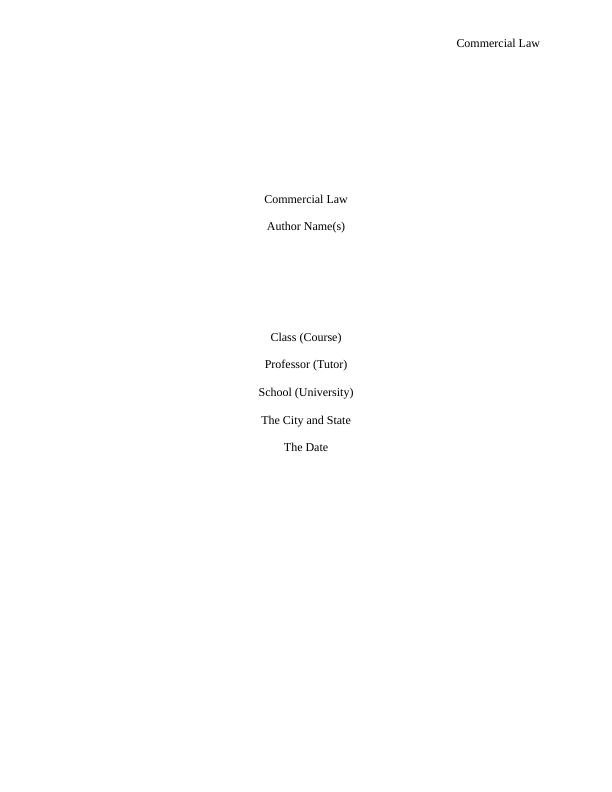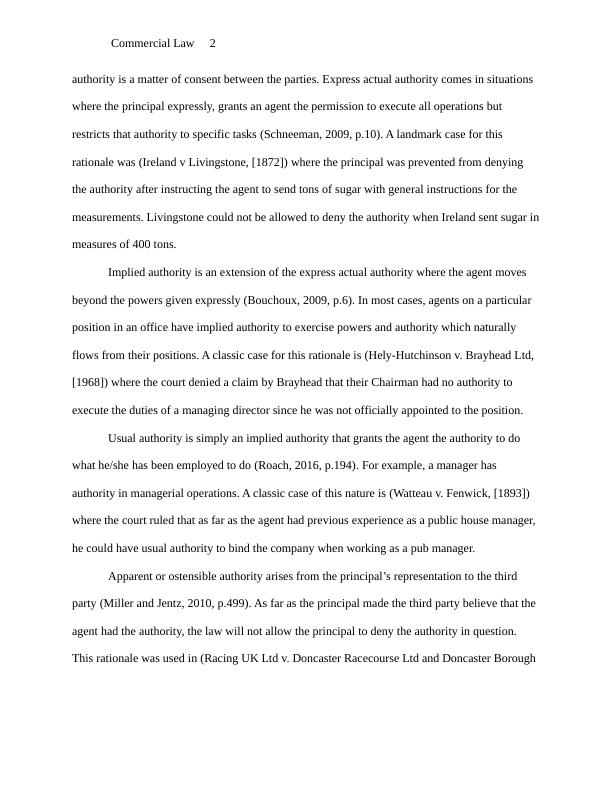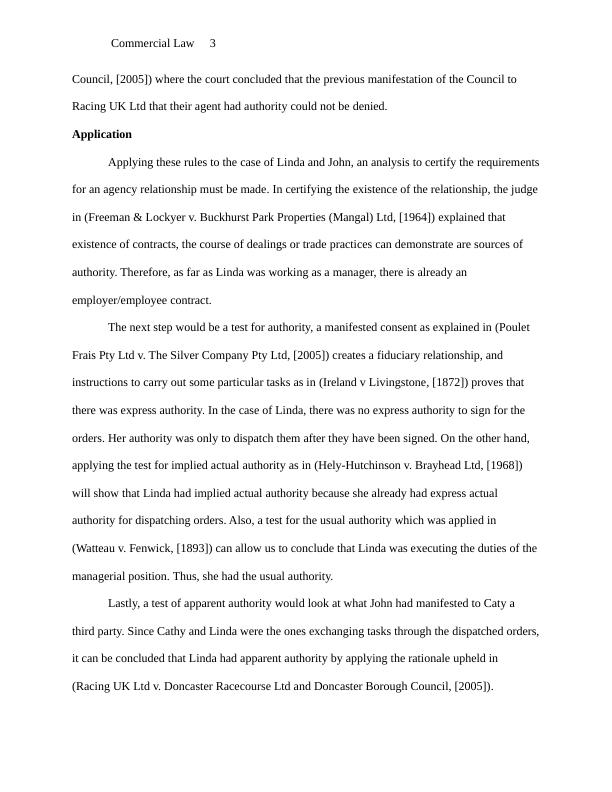Understanding Undue Influence in Commercial Law
Added on 2023-06-05
12 Pages3791 Words99 Views
Commercial Law
Commercial Law
Author Name(s)
Class (Course)
Professor (Tutor)
School (University)
The City and State
The Date
Commercial Law
Author Name(s)
Class (Course)
Professor (Tutor)
School (University)
The City and State
The Date

Commercial Law 1
Issue
The main issue in this scenario regards the authority of an agent. Linda was the agent of
John (principal). This scenario brings the issues such as did Linda had apparent authority to order
the goods on behalf of John? Can John assert that Linda had no authority to order the goods?
Rule
The three main features of an agency relationship are the consent given by both the
principal and its agent, the authority, and the principal’s control (Thampapillai et al., 2015,
p.140). The creation of this relationship was explained by Diplock LJ in (Freeman & Lockyer v.
Buckhurst Park Properties (Mangal) Ltd, [1964]) that the principal/agent relationship is a legal
relationship originating from an agreement between an agent and its principal. In (South Sydney
District Rugby League Football Club Ltd v. News Ltd, [2000]), Finn LJ stated that this
agreement can be ascertained through the application of principles of a contract, express words,
trade practices, or the course dealings.
In this agency relationship, if an agent enters into contracts with third parties, the
contract is deemed to have been created between the principal and those third parties. The work
of (Stoljar, 1961, p.264) explains this rationale with the case of (Hubbard v. Tenbrook, [1889]).
The judge stated that it would be a fraud to the public if the principal who absorbs the profit is
allowed to escape when the pinch comes.
An agent cannot act without the legal authority of the principal, and the principal places
all the trust and reliance on the agent (fiduciary relationship). Legal authority in an agency
relationship can be express or implied. Actual authority was explained in (Poulet Frais Pty Ltd v.
The Silver Company Pty Ltd, [2005]) where the Full Federal Court explained that actual
Issue
The main issue in this scenario regards the authority of an agent. Linda was the agent of
John (principal). This scenario brings the issues such as did Linda had apparent authority to order
the goods on behalf of John? Can John assert that Linda had no authority to order the goods?
Rule
The three main features of an agency relationship are the consent given by both the
principal and its agent, the authority, and the principal’s control (Thampapillai et al., 2015,
p.140). The creation of this relationship was explained by Diplock LJ in (Freeman & Lockyer v.
Buckhurst Park Properties (Mangal) Ltd, [1964]) that the principal/agent relationship is a legal
relationship originating from an agreement between an agent and its principal. In (South Sydney
District Rugby League Football Club Ltd v. News Ltd, [2000]), Finn LJ stated that this
agreement can be ascertained through the application of principles of a contract, express words,
trade practices, or the course dealings.
In this agency relationship, if an agent enters into contracts with third parties, the
contract is deemed to have been created between the principal and those third parties. The work
of (Stoljar, 1961, p.264) explains this rationale with the case of (Hubbard v. Tenbrook, [1889]).
The judge stated that it would be a fraud to the public if the principal who absorbs the profit is
allowed to escape when the pinch comes.
An agent cannot act without the legal authority of the principal, and the principal places
all the trust and reliance on the agent (fiduciary relationship). Legal authority in an agency
relationship can be express or implied. Actual authority was explained in (Poulet Frais Pty Ltd v.
The Silver Company Pty Ltd, [2005]) where the Full Federal Court explained that actual

Commercial Law 2
authority is a matter of consent between the parties. Express actual authority comes in situations
where the principal expressly, grants an agent the permission to execute all operations but
restricts that authority to specific tasks (Schneeman, 2009, p.10). A landmark case for this
rationale was (Ireland v Livingstone, [1872]) where the principal was prevented from denying
the authority after instructing the agent to send tons of sugar with general instructions for the
measurements. Livingstone could not be allowed to deny the authority when Ireland sent sugar in
measures of 400 tons.
Implied authority is an extension of the express actual authority where the agent moves
beyond the powers given expressly (Bouchoux, 2009, p.6). In most cases, agents on a particular
position in an office have implied authority to exercise powers and authority which naturally
flows from their positions. A classic case for this rationale is (Hely-Hutchinson v. Brayhead Ltd,
[1968]) where the court denied a claim by Brayhead that their Chairman had no authority to
execute the duties of a managing director since he was not officially appointed to the position.
Usual authority is simply an implied authority that grants the agent the authority to do
what he/she has been employed to do (Roach, 2016, p.194). For example, a manager has
authority in managerial operations. A classic case of this nature is (Watteau v. Fenwick, [1893])
where the court ruled that as far as the agent had previous experience as a public house manager,
he could have usual authority to bind the company when working as a pub manager.
Apparent or ostensible authority arises from the principal’s representation to the third
party (Miller and Jentz, 2010, p.499). As far as the principal made the third party believe that the
agent had the authority, the law will not allow the principal to deny the authority in question.
This rationale was used in (Racing UK Ltd v. Doncaster Racecourse Ltd and Doncaster Borough
authority is a matter of consent between the parties. Express actual authority comes in situations
where the principal expressly, grants an agent the permission to execute all operations but
restricts that authority to specific tasks (Schneeman, 2009, p.10). A landmark case for this
rationale was (Ireland v Livingstone, [1872]) where the principal was prevented from denying
the authority after instructing the agent to send tons of sugar with general instructions for the
measurements. Livingstone could not be allowed to deny the authority when Ireland sent sugar in
measures of 400 tons.
Implied authority is an extension of the express actual authority where the agent moves
beyond the powers given expressly (Bouchoux, 2009, p.6). In most cases, agents on a particular
position in an office have implied authority to exercise powers and authority which naturally
flows from their positions. A classic case for this rationale is (Hely-Hutchinson v. Brayhead Ltd,
[1968]) where the court denied a claim by Brayhead that their Chairman had no authority to
execute the duties of a managing director since he was not officially appointed to the position.
Usual authority is simply an implied authority that grants the agent the authority to do
what he/she has been employed to do (Roach, 2016, p.194). For example, a manager has
authority in managerial operations. A classic case of this nature is (Watteau v. Fenwick, [1893])
where the court ruled that as far as the agent had previous experience as a public house manager,
he could have usual authority to bind the company when working as a pub manager.
Apparent or ostensible authority arises from the principal’s representation to the third
party (Miller and Jentz, 2010, p.499). As far as the principal made the third party believe that the
agent had the authority, the law will not allow the principal to deny the authority in question.
This rationale was used in (Racing UK Ltd v. Doncaster Racecourse Ltd and Doncaster Borough

Commercial Law 3
Council, [2005]) where the court concluded that the previous manifestation of the Council to
Racing UK Ltd that their agent had authority could not be denied.
Application
Applying these rules to the case of Linda and John, an analysis to certify the requirements
for an agency relationship must be made. In certifying the existence of the relationship, the judge
in (Freeman & Lockyer v. Buckhurst Park Properties (Mangal) Ltd, [1964]) explained that
existence of contracts, the course of dealings or trade practices can demonstrate are sources of
authority. Therefore, as far as Linda was working as a manager, there is already an
employer/employee contract.
The next step would be a test for authority, a manifested consent as explained in (Poulet
Frais Pty Ltd v. The Silver Company Pty Ltd, [2005]) creates a fiduciary relationship, and
instructions to carry out some particular tasks as in (Ireland v Livingstone, [1872]) proves that
there was express authority. In the case of Linda, there was no express authority to sign for the
orders. Her authority was only to dispatch them after they have been signed. On the other hand,
applying the test for implied actual authority as in (Hely-Hutchinson v. Brayhead Ltd, [1968])
will show that Linda had implied actual authority because she already had express actual
authority for dispatching orders. Also, a test for the usual authority which was applied in
(Watteau v. Fenwick, [1893]) can allow us to conclude that Linda was executing the duties of the
managerial position. Thus, she had the usual authority.
Lastly, a test of apparent authority would look at what John had manifested to Caty a
third party. Since Cathy and Linda were the ones exchanging tasks through the dispatched orders,
it can be concluded that Linda had apparent authority by applying the rationale upheld in
(Racing UK Ltd v. Doncaster Racecourse Ltd and Doncaster Borough Council, [2005]).
Council, [2005]) where the court concluded that the previous manifestation of the Council to
Racing UK Ltd that their agent had authority could not be denied.
Application
Applying these rules to the case of Linda and John, an analysis to certify the requirements
for an agency relationship must be made. In certifying the existence of the relationship, the judge
in (Freeman & Lockyer v. Buckhurst Park Properties (Mangal) Ltd, [1964]) explained that
existence of contracts, the course of dealings or trade practices can demonstrate are sources of
authority. Therefore, as far as Linda was working as a manager, there is already an
employer/employee contract.
The next step would be a test for authority, a manifested consent as explained in (Poulet
Frais Pty Ltd v. The Silver Company Pty Ltd, [2005]) creates a fiduciary relationship, and
instructions to carry out some particular tasks as in (Ireland v Livingstone, [1872]) proves that
there was express authority. In the case of Linda, there was no express authority to sign for the
orders. Her authority was only to dispatch them after they have been signed. On the other hand,
applying the test for implied actual authority as in (Hely-Hutchinson v. Brayhead Ltd, [1968])
will show that Linda had implied actual authority because she already had express actual
authority for dispatching orders. Also, a test for the usual authority which was applied in
(Watteau v. Fenwick, [1893]) can allow us to conclude that Linda was executing the duties of the
managerial position. Thus, she had the usual authority.
Lastly, a test of apparent authority would look at what John had manifested to Caty a
third party. Since Cathy and Linda were the ones exchanging tasks through the dispatched orders,
it can be concluded that Linda had apparent authority by applying the rationale upheld in
(Racing UK Ltd v. Doncaster Racecourse Ltd and Doncaster Borough Council, [2005]).

End of preview
Want to access all the pages? Upload your documents or become a member.
Related Documents
Authority in Agency Law: Analysis of Actual, Usual, and Ostensible Authoritylg...
|13
|3825
|359
The Law of Agency - Assignmentlg...
|7
|2425
|96
Commercial Lawlg...
|10
|2329
|1
Legal Rights of AFS Grocery Wholesalers Co Pty Ltd and Bruno in Contractslg...
|12
|3228
|353
BSL165 - Foundations of Business Lawlg...
|8
|1768
|190
Business Lawlg...
|6
|1208
|371
